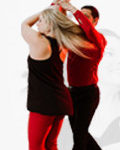There are a lot of syncopations available in west coast swing. However, the safest option is walks.
Because west coast swing is a two-beat dance, styling & play happen in two-beat units. I explain in this video
So, if you can fill two-beat units with stylized movement, you can look good while you or your partner play.
A pair of walking steps is finished every two beats, so you can naturally go from walking back to the WCS pattern structure. And, unlike triples, walks will end on the same foot after every two beats.
With triples (or other odd rhythm syncopations like rondes or drags), you can be caught on the wrong foot if your partner ends the play before you do.
Advanced dancers can learn to fix their footwork, but when you’re starting off it’s easier to not worry about being on the wrong foot in the first place.
Looking for some Anchor Step Styling Options? Download> 5 Ways to Style your Anchor Step
Your Drill:
By yourself, put on some music and start taking walking steps: one step on every beat
Your goal is to add some life to these walks.
This is an experimental drill, so just try things and see what feels good.
You can try transferring your weight faster or slower, being more staccato or smooth, using more or less hip, changing levels, adding shoulder hits or chest pops, etc. At this stage, there isn’t a right or wrong way of doing things.
Your goal is to experiment with as many configurations as possible. Most of them will feel weird, and that’s okay.
What you are trying to do is find the 10% or so of movements that feel like they might be worth polishing up.
Remember that you are dancing with the music: use the music to inspire your choices. If you are hearing drawn out vocal phrases, find some part of your body that can match that draw. It can be your shoulders, your arm, your feet, whatever. Use the sounds you hear to suggest ideas for how your body can move. Again, most of this will be junk.
Keep trying different things until you find an option that isn’t awful.
Once you have found a movement that might have potential, go in front of a mirror, a video camera, or a trusted friend.
Practice doing the movement in different ways.
Refine your understanding of how your body creates the motion so you can control how it looks every time.
This is not always a short process. You might be able to figure out the movement quickly if you are very kinesthetically aware, but for most people it will take a while. The good news is that this process of practicing will make you more able to control new movements in the future, so the tenth session will be much easier than the first.
This is the part of dancing that is challenging to teach because it requires adaptation to your body.
No pro can just give you a movement—you need to learn how to put that movement in your body.
You can get ideas and inspiration from what other dancers do, but unless you put in the practice time discovering how it works for your body, it won’t translate to the dance floor.
Want more styling ideas?
We have a complete guide for you!
Leaders: The Ultimate Guide to Leaders Styling
Followers: The Ultimate Guide to Ladies Styling



 Brian & Megan
Brian & Megan